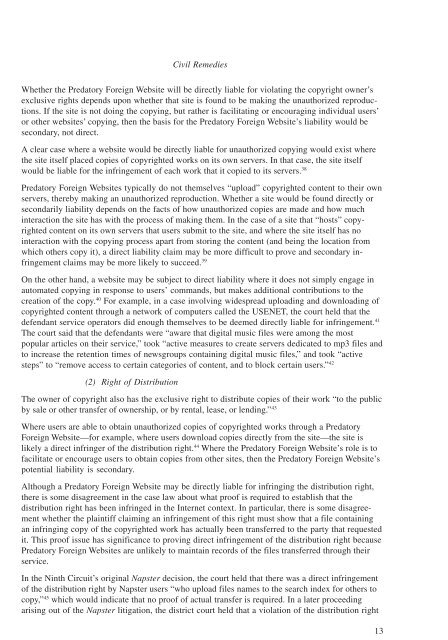1oz61wa
1oz61wa
1oz61wa
You also want an ePaper? Increase the reach of your titles
YUMPU automatically turns print PDFs into web optimized ePapers that Google loves.
Civil Remedies<br />
Whether the Predatory Foreign Website will be directly liable for violating the copyright owner’s<br />
exclusive rights depends upon whether that site is found to be making the unauthorized reproductions.<br />
If the site is not doing the copying, but rather is facilitating or encouraging individual users’<br />
or other websites’ copying, then the basis for the Predatory Foreign Website’s liability would be<br />
secondary, not direct.<br />
A clear case where a website would be directly liable for unauthorized copying would exist where<br />
the site itself placed copies of copyrighted works on its own servers. In that case, the site itself<br />
would be liable for the infringement of each work that it copied to its servers. 38<br />
Predatory Foreign Websites typically do not themselves “upload” copyrighted content to their own<br />
servers, thereby making an unauthorized reproduction. Whether a site would be found directly or<br />
secondarily liability depends on the facts of how unauthorized copies are made and how much<br />
interaction the site has with the process of making them. In the case of a site that “hosts” copyrighted<br />
content on its own servers that users submit to the site, and where the site itself has no<br />
interaction with the copying process apart from storing the content (and being the location from<br />
which others copy it), a direct liability claim may be more difficult to prove and secondary infringement<br />
claims may be more likely to succeed. 39<br />
On the other hand, a website may be subject to direct liability where it does not simply engage in<br />
automated copying in response to users’ commands, but makes additional contributions to the<br />
creation of the copy. 40 For example, in a case involving widespread uploading and downloading of<br />
copyrighted content through a network of computers called the USENET, the court held that the<br />
defendant service operators did enough themselves to be deemed directly liable for infringement. 41<br />
The court said that the defendants were “aware that digital music files were among the most<br />
popular articles on their service,” took “active measures to create servers dedicated to mp3 files and<br />
to increase the retention times of newsgroups containing digital music files,” and took “active<br />
steps” to “remove access to certain categories of content, and to block certain users.” 42<br />
(2) Right of Distribution<br />
The owner of copyright also has the exclusive right to distribute copies of their work “to the public<br />
by sale or other transfer of ownership, or by rental, lease, or lending.” 43<br />
Where users are able to obtain unauthorized copies of copyrighted works through a Predatory<br />
Foreign Website—for example, where users download copies directly from the site—the site is<br />
likely a direct infringer of the distribution right. 44 Where the Predatory Foreign Website’s role is to<br />
facilitate or encourage users to obtain copies from other sites, then the Predatory Foreign Website’s<br />
potential liability is secondary.<br />
Although a Predatory Foreign Website may be directly liable for infringing the distribution right,<br />
there is some disagreement in the case law about what proof is required to establish that the<br />
distribution right has been infringed in the Internet context. In particular, there is some disagreement<br />
whether the plaintiff claiming an infringement of this right must show that a file containing<br />
an infringing copy of the copyrighted work has actually been transferred to the party that requested<br />
it. This proof issue has significance to proving direct infringement of the distribution right because<br />
Predatory Foreign Websites are unlikely to maintain records of the files transferred through their<br />
service.<br />
In the Ninth Circuit’s original Napster decision, the court held that there was a direct infringement<br />
of the distribution right by Napster users “who upload files names to the search index for others to<br />
copy,” 45 which would indicate that no proof of actual transfer is required. In a later proceeding<br />
arising out of the Napster litigation, the district court held that a violation of the distribution right<br />
13


